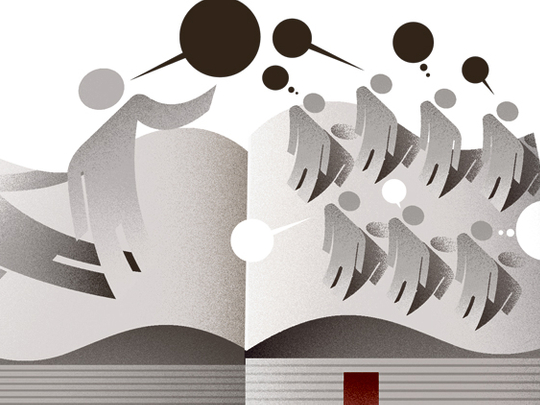
I don't think I've ever been as disciplined in attending any event as I was with the Emirates Literature Festival. It was not close to where I lived and the fact that it took place just before Art Dubai certainly made attending all the sessions a challenge. But all this didn't matter because the content was great. The genuine quality of the speakers and significant value of what was said and discussed was nothing short of inspirational; you only had to check the #dxblit twitter channel to read the live commentary of the audience it was both positive and critical.
The fair was fantastic because it directly and indirectly pre-empted many questions Dubai's audience had over many issues; from Robert Greene's ideas on the future of the global landscape to Yousuf Ziedan's views on why it was not inappropriate for a Muslim to write a historic novel on early Coptics in Egypt. I listened to Margaret Macmillan discuss how history is used and abused and John Simpson a few hours later would appropriately follow up with how he saw the 20th century reported. I heard five different Arab women writers disagree on whether to dismiss men as opponents or challenge them, and a few more ideas in-between. I heard Shobhaa Dé's fiery talk on why India is great and how much work it must do. I laughed my heart out during Marjane Satrapi's illuminating chat about her story and how she got to where she is. I also heard a group of Arabic writers explain their alternative writing collective and prize and followed that by attending a discussion on the prospects of Saudi Arabia. I listened to all of that in just four days and learned four months' worth of knowledge.
Everyone I saw there was curious and wanted to know more about the subject of the panels they attended. Simply put, the festival was inspiring and to describe it as a literature festival alone is almost a disservice. On behalf of all those who attended the festival, thank you Isobel Abulhoul for delivering such a timely festival for Dubai.
For all its success, the festival is essentially run by a team of three (Isobel included). They need your help, should the matter at hand interest you. More specifically, this energy must not be called upon once a year and allowed to be lost and dispersed in between. The festival is currently the most appropriate vehicle for the establishment of a significant circle of writers, thinkers and analysts who in time could lay the foundation for an intelligentsia in the UAE. The Emirates desperately lacks the development of schools of literary and philosophical thought that have for the most part died with the death of pan-Arabism towards the end of the seventies.
I saw them everywhere I looked in the festival. They were curious, they were passionate and most of all they were determined. They were determined to translate this impassioned curiosity into structured thought and action. All this cannot be lost and it all starts with the festival. First, we arrange for similar talks to occur throughout the year. This is very easy to do: Dubai is one of the main travel hubs of the world and writers are flying through all the time and their schedules are booked by their publishers early on.
Stop-over
So with a bit of planning and a little help from Emirates airlines and InterContinental hotels, a 24-hour stop-over can be organised and evenings arranged with public talks followed by special invitation dinners with the writer and the festival's circle of UAE-based intellectuals. Alongside that, two things must happen: a) Readers must share the joy of reading with their friends and families. Everyone can start a book club and it shouldn't be hectic or too often in the beginning; it can start with as low as four books a year. b) It may be a long time before the UAE's curriculum is reviewed in a thorough manner, which should include extra-curricular required readings.
However, there is no reason why this reading cannot be pushed informally by teachers right now. With technology continually improving, so will the appeal of e-books and readers such as Amazon's Kindle and Apple's iPad. Within the next five to 10 years, people will become more comfortable with reading off such gadgets instead of the traditional book and it will become significantly cheaper to publish literary content. What's more, like the incredible appeal of shorter TV productions as opposed to films over the last 20 years, it will become very common for books to be published in chapters that will be streamed to subscribers as they are published. Finally, what the UAE would really benefit from are patron-sponsored literary majlis/salons — inspired by both the Arabic majlis and the French salon; an intelligentsia would quickly form around these spaces of dialogue and monologue.
Such is the potential I see in what Isobel Abulhoul started. Let us help her help us think and feel again. Let us help her build a civil society.
Mishaal Al Gergawi is an Emirati commentator on socio-economic and cultural affairs in the UAE.












